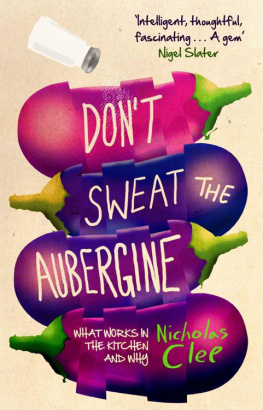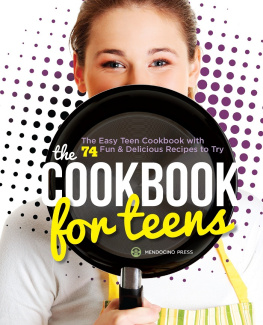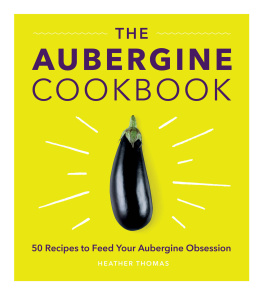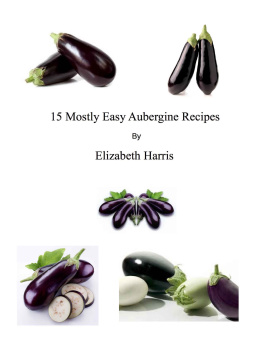About the Book
Have you ever followed a recipe to the letter and found that it doesnt work? Or been baffled by the instructions? Help is at hand.
Dont Sweat the Aubergine tells you how to cook everything from a boiled egg to a souffl; a sausage to a cassoulet; cheese on toast to cheescake. And, uniquely, it explains each recipe, showing what you can expect to happen to the food as you prepare it, and why you should beware of vague commands passed down from cookbook to cookbook. Washing rice, sealing meat, sifting flour, salting aubergines: what is the point of these techniques, and are they really necessary?
Nicholas Clees lively and accessible guide is packed with delicious dishes to broaden your range of standbys, and invaluable advice that will inspire you to create recipes of your own. Its the last cookbook youll ever need to buy...
CONTENTS
DONT SWEAT THE AUBERGINE
What works in the kitchen and why
Nicholas Clee
For Nicolette, Rebecca and Laura
Introduction to the second edition
It has been somewhat chastening to return to this book and read the advice that I gave, quite confidently, but no longer follow. While Im still careful not to overcook the vegetables in a chicken stock, for example, I happily leave the meat and bones cooking for quite some time and in a covered pot, too. I implied in the first edition that you could cook a joint of meat more slowly in the oven if you left it uncovered, but have since realized that the rule does not work for me, because I cannot set my oven dial lower than 130C. I no longer add salt and vinegar to the water when I poach eggs. The blindingly obvious reason why I always overcooked rice when I pre-soaked it has at last dawned on me.
I omitted pastry and cakes from the first edition. The reason, I told myself, was that they did not suit the spirit of the book, which aimed to provide general principles around which you could improvise. With pastry and cakes, you follow the instructions, full stop. But I was kidding myself. The real reason for leaving them out was that I was useless at making them. Its a matter of dexterity, and perhaps of patience. I cannot do anything neatly. My pastry and cakes are uneven, raggedy affairs.
They do not taste too bad these days, however. They are, as I have come to admit to myself, just like any other branch of cooking: if you have a vague understanding about what the ingredients do, you have a reasonable chance of getting them to behave in the way you want.
The most stressful event in your life, I have read, is moving house. Giving a speech is up there too. Weddings can cause a good degree of anxiety. Heres another scenario to get you in a sweat: there are eight people coming to dinner, youre attempting a dish you havent prepared before, and its not going well.
Why did you buy a whole leg of lamb? Boning it might have taken Gordon Ramsay five minutes, but took you forty-five. You have spent a further half an hour inserting little bits of rosemary and garlic, which stuck to your fingers, into the flesh. The cannellini beans to go with it were supposed to be cooked by now, but the one youve just tasted had the consistency of a pebble. Lacking a gratin dish, preferably earthenware for the gratin dauphinois, you made do with your old Pyrex, and you stuck to the quantity of milk and cream specified in the recipe even though the liquid came only halfway up the potatoes. Now the liquid has evaporated, and the potatoes are still crunchy. Then theres the pudding: did you allow some yolk to seep into the whites when you separated the eggs? After ten minutes of beating, the whites have barely turned white, let alone risen to what the book describes as soft, snowy peaks. Meanwhile your flatmate/boyfriend/girlfriend/husband/wife, having promised to lay the table and clean the glasses, is still in the bloody bathroom.
I think that we get into these flaps because food experts, and our own insecurities, have led us to think of cookery as the fulfilment of recipes. The recipe sets the standard to which we aspire. If the dish doesnt work as the cookery writers suggested it would, we must have done something wrong. We have all felt those moments of panicked helplessness when natural processes have refused to conform to our hopes.
The recipe said, Heat 200ml of cream and 50ml of milk, and pour over; the liquid should be level with the top of the potatoes. But the liquid wasnt level with the top; it came only halfway up. I must have sliced the potatoes too thin, you conjecture. Or too thick. Or used the wrong kind of dish. But the recipe specified that amount of liquid, so Id better not add any more, or something else will go wrong. Oh, no: the dish has dried up and the potatoes are uncooked. Im a failure.
Let me illustrate the drawbacks of adhering rigidly to recipes with a couple of examples. Both dishes contain lamb, and both sound as if they should be straightforward, flavourful and unfussy.
The first appeared in my Sunday colour supplement. Its lamb cutlets with Mediterranean vegetables. You cut plum tomatoes lengthways, sprinkle with olive oil, sea salt and icing sugar, and bake for about two hours. You colour halved onions and whole shallots, sprinkle them with oil, sugar and thyme, and bake them in a foil parcel. You saut sliced courgettes for two to three minutes; you saut sliced aubergines for five to eight minutes; you put all the vegetables together. You wash and top some green beans; you slice fennel with a mandolin. Then you season your rack of lamb, colour it for two minutes each side in a frying pan, and put it in the oven for five minutes. Boil the beans, add them to the fennel with some olives, olive oil and basil. Assemble the lamb, bean mixture and courgette mixture on four plates.
There is a place for this kind of recipe. That place is in the kitchen of the Michelin-starred chef who wrote it, or in the homes of enthusiastic amateurs such as those who appear on the television programme Masterchef. I am an everyday cook. I am never going to prepare this version of lamb cutlets with Mediterranean vegetables.
The second recipe is typical of the hearty stews you find in books celebrating country cooking:
Lard
1kg shoulder of lamb, cubed
4 carrots, sliced
3 onions, thinly sliced
1 dstsp flour
1 glass white wine
4 medium turnips, sliced
1 bouquet garni
Salt and pepper
In a casserole, heat a layer of lard, and brown the lamb in it. Add the carrots and onions and, when golden, sprinkle on the flour. Throw in the white wine, and the turnips. Add the bouquet garni, and season with salt and pepper. Simmer for two hours, adding a little water if the stew is in danger of drying out.
That looks like something I might be bothered to tackle. But I have some doubts about the details. Lamb is fatty; with lard as well, the sauce in the stew is not going to be easy to digest. Like many stews, this one has vegetables that flavour the sauce and that are also part of the finished dish. After two hours , the sauce, not the vegetables, will contain the flavour. The carrots, as anyone who has eaten overcooked specimens of this vegetable knows, will be particularly dull.
The recipe tells you to use pepper. But ground pepper, if simmered in liquid for some time, becomes acrid.
The consistency of the sauce might also be a problem. The recipe tells you to add water if the dish is in danger of drying out; but you are more likely to find that water from the vegetables and juices from the meat, with only a dessertspoon of flour to thicken them, produce more liquid than you want. Perhaps youre meant to leave the pot uncovered, to allow the sauce to reduce; but have you noticed how often recipes omit this important detail?
Next page








